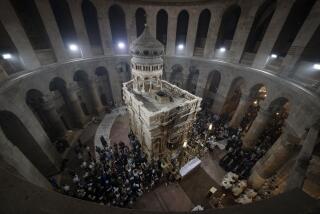Vatican, Israel Trade Charges Over Mosque
- Share via
NAZARETH, Israel — Thousands of triumphant Muslims on Tuesday unveiled a cornerstone for a mosque next to a major Christian shrine in the heart of Jesus’ boyhood town--a ceremony that set off bitter recriminations between the Vatican and Israel.
The Vatican said Israel, by allowing the mosque to be built, was “laying the foundation” for division. Israel hinted that the Holy See’s protests were motivated in part by anti-Semitism.
The Muslim ceremony, replete with defiant chants and fervent prayers, prompted church leaders to close Christian shrines across the Holy Land. Many pilgrims were dismayed or confused.
The mosque, designed to be at least four stories tall, is due to rise a short way from the Basilica of the Annunciation, which Christians revere as the spot where the angel Gabriel told the Virgin Mary that she would bear the son of God.
In Tuesday’s ceremony, several thousand Islamic activists cheered when a green cloth was lifted from the cornerstone, a beige marble slab. Hundreds shook their fists and chanted, “With our blood and spirit, we will redeem you, Shihab el Din!” a reference to the 12th century anti-Crusader cleric they believe to be buried at the site.
Fireworks lighted the late-afternoon sky, and activists passed around trays overflowing with the sticky sweets thick with nuts and sesame oil that are traditional to the region. Christian shopkeepers in the area closed early.
Responding to the Muslims’ show of force, the Vatican said Israel bore responsibility for “creating the basis for instigating division.”
“The decision of the Israeli government seems to lay the foundation for future conflicts and tensions between the two communities, Christian and Islam,” said Vatican spokesman Joaquin Navarro-Valls.
Israel’s Foreign Ministry rejected the charge, saying it “unfortunately recalls the ancient practice of pointing the finger at the wrong cause”--an allusion to anti-Semitism.
At the Church of the Holy Sepulcher in Jerusalem, believed to be the site of Jesus’ crucifixion, pilgrims were disappointed to find the gates locked. The Vatican had taken the lead, but other denominations, including Greek Orthodox and Armenian, also backed the decision to close churches on Monday and Tuesday.
The two-year dispute over the mosque has raised tensions between Muslims and Christians in Nazareth, one of Pope John Paul II’s expected stops during a trip in March.
More to Read
Sign up for Essential California
The most important California stories and recommendations in your inbox every morning.
You may occasionally receive promotional content from the Los Angeles Times.













